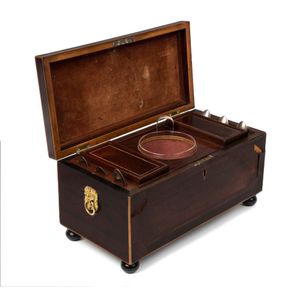Satinwood Tea Caddy with Silver Spoons and Lion Handles
A George III satinwood inlaid mahogany tea caddy, with a matching set of silver tea spoons by John, Henry & Charles Lias of London, circa 1823, with gilt bronze lion form ring handles, standing on bun feet, original bowl and tongs, 20.5 cm high, 25.5 cm wide, 18 cm deep
You must be a subscriber, and be logged in to view price and dealer details.
Subscribe Now to view actual auction price for this item
When you subscribe, you have the option of setting the currency in which to display prices to $Au, $US, $NZ or Stg.
This item has been sold, and the description, image and price are for reference purposes only.
- Bronze - An alloy of copper and tin, traditionally in the proportions of about 9 parts of copper to 1 part of tin.
The discovery of bronze in Western Asia in the 4th century enabled people to create metal objects which were superior to those previoulsy possible because of its strength and hardness, and it has been used throughout the world for weapons, coins, tools, statuary and other decorative items.
It is very fluid in a molten state, and its hardness, strength when set, and non-corrosive properties makes it most suitable for casting sculpture. - George Iii - George III (1738 - 1820) was King of Great Britain and Ireland from 1760 to 1820.
- Mahogany - Mahogany is a dense, close grained red-coloured timber from the West Indies and Central America. It was first imported into Europe in the the early 18th century and its use continued through the 19th century. It was popular for furniture making because of its strength, the wide boards available, the distinctive grain on some boards, termed flame mahogany and the rich warm colour of the timber when it was polished.. The "flame" was produced where a limb grew out from the trunk of the tree, and this timber was usually sliced into veneers for feature panels on doors, backs and cornices.
Some terms used to describe mahogany relate to the country from which it originally came, such as "Cuban" mahogany, "Honduras" mahogany etc. However unless the wood has been tested the names assigned are more a selling feature, rather than a true indication of the timber's origin. - Circa - A Latin term meaning 'about', often used in the antique trade to give an approximate date for the piece, usually considered to be five years on either side of the circa year. Thus, circa 1900 means the piece was made about 1900, probably between 1895 and 1905. The expression is sometimes abbreviated to c.1900.
- Satinwood - Satinwood is a dense pale gold coloured timber that was imported into Britain in the second half of the 18th century, and early 19th centuries from the East Indies and the West Indies. The name derives from the satin-like surface sheen when the timber is polished.
It was used in the solid, as a veneer and in inlays. As well as furniture, satinwood was used for making musical instruments, barometers, boxes and clocks.
It will usually be found on only the very best quality objects, presumably because of of its cost at the time.
This item has been included into following indexes:
- tea caddies, material
- tea caddies, period or age - Georgian 327
